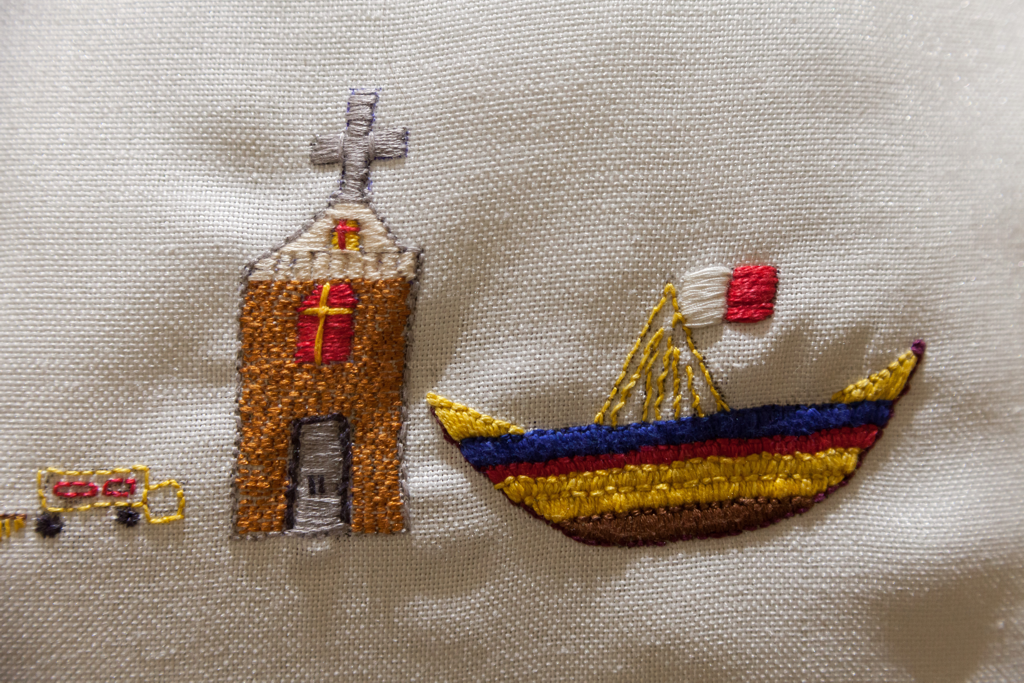
The craft of embroidery transforms and embellishes the experiences of the caregivers: it evacuates them from the confines of the private household and turns into artworks accessible to the public.
by Raisa Galea
Photograph by Darren Aguis
[dropcap]T[/dropcap]he arrivals of foreign caregivers—most of whom are women from Philippines—to Malta do not draw vociferous protests by enraged nationalists. Unlike the African migrants and refugees, whose distress is a regular feature on the front pages, these women are not on the media radar. Whereas the presence of predominantly male migrant workers in Malta is conspicuous due to their occupation at construction sites, street maintenance and other outdoor services, Filipinas are rendered invisible by the confines of domestic sphere where they are employed. Their experiences, therefore, remain unknown and their input into the Maltese society goes unacknowledged.
“Exiled Homes: Embroiderers of Actuality” is a project by Aglaia Haritz and Abdelaziz Zerrou, in cooperation with anthropologist Gisella Orsini, Elise Billiard, Sarah Mallia and supported by Gabriel Caruana Foundation. The project creates a space for the stories of community of Filipino care workers and home helpers in Malta. It also challenges the stereotype of docile, obedient performers of household tasks which Filipinas have become intrinsically associated with.
The exhibition, which is on display at The Mill until 13th July, consists of three sections: video records of the interviews with 6 Filipina workers, the embroidered cushions with a speaker inside and a video of 15 women singing the Maltese national anthem in Tagalog, a language of the Philippines.
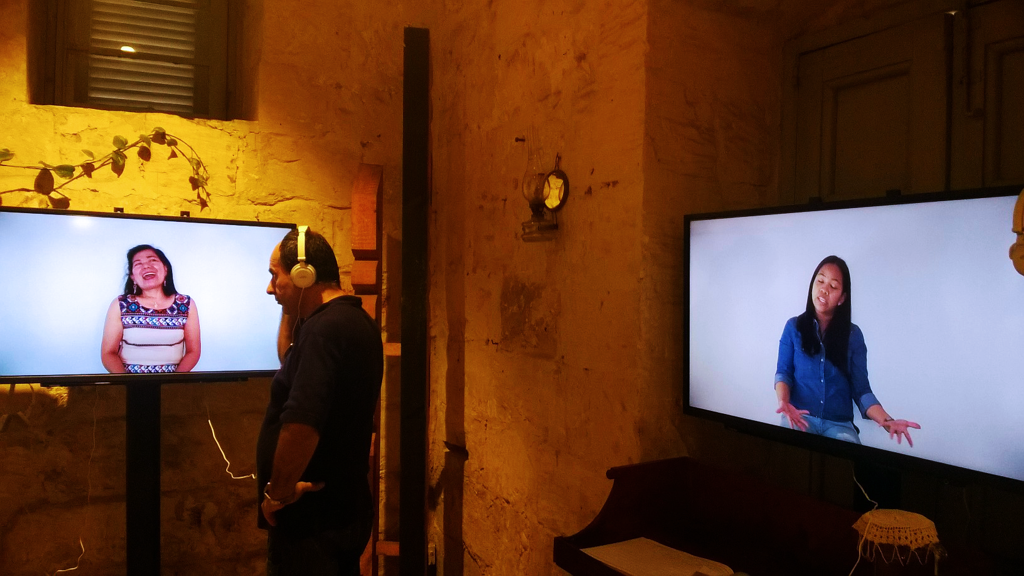
In the interview Ritzel, Nida, Jenifer, Criselda, Lorna and Jazmin talk about why, how and when they came to Malta, whether they have any friends here and what they dream about. All of them share experiences in a casual and expressive manner, with no hint of hesitation, encouraging a sense of intimacy with a viewer.
Their stories sound similar: they all came to Malta to work as home helpers and to look after elderly persons, although two of them originally intended to work in the US and Italy. None of them knew much about Malta before setting foot here and their first impression of it was a surprise. Lorna, previously a factory worker who was notified about a job opportunity by a friend, says that Malta did not match her perception of a European country. “The airport is small”, she says, “there are no tall buildings or large shopping malls.”
Their impressions of Malta offer a glimpse of how a generic European country is pictured in the Philippines—an idea which the Maltese are mostly unaware of. The absence of prosperity symbols identified with Europe in the eyes of Filipinos, such as tall buildings and large shopping malls, suggested that Malta was an unaccomplished country. Their impressions have changed since then. All of the women grew to appreciate their second home country with time and find the quality of life in Malta decent.
Among their favourite characteristics of Malta are the weather and the people. Jenifer, Criselda and Lorna say they like the people here. Criselda adds: “Maltese are a very accommodating kind. My landlord even gives me clothes.” Nida’s experience with the first employers was not as elated: she was kept without a salary for three months.
[perfectpullquote align=”full” bordertop=”false” cite=”” link=”” color=”” class=”” size=””]Some of them left their children—still minors—in the Philippines in the hope earning a better wage than their home country could offer.[/perfectpullquote]
Their dreams are similar too. The women look forward to returning home, reuniting with their families and leading stable lives with no deprivation. Some of them left their children—still minors—in the Philippines in the hope of earning a better wage than their home country could offer.
Listening to the stories, watching these women smile, laugh, share their dreams, I could not help but notice how easily these experiences could be interpreted as a testimony to the European generosity and embrace of diversity. Don’t the Europeans, Maltese included, give less fortunate an opportunity to earn a living and have a more prosperous future? Subscribing to such a narrative would mean to neglect gross injustices woven into these stories, despite the positive feel they convey.
Anthropologist Gisella Orsini, who conducted the interviews, states that “the caregivers work 6 days per week, mostly 24 hours per day with 1 day off, and have 1 month leave per year, which is usually used to return to the Philippines.” Although their labour is physically and emotionally demanding, it is not sufficiently rewarded in monetary terms: they are entitled to the minimum wage (€735.63 per month at the time of the interviews).
[perfectpullquote align=”full” bordertop=”false” cite=”” link=”” color=”” class=”” size=””]Domestic labour, poorly rewarded and largely underappreciated by society, still remains the lot of women—of those who are bound to perform it in the absence of other opportunities.[/perfectpullquote]
Another thought-provoking aspect of the project is how it exposes the contradictions in the contemporary Western perception of gender roles. On the one hand, the work these women perform belongs to the domain traditionally assigned to female family members. It used to be the responsibility of daughters, daughters-in-law and younger sisters to look after the elderly.
The contemporary Western society places different expectations on women: having a career outside of the domestic sphere has become a measure for success for them too. As more women in economically advanced countries, including Malta, are moving away from household tasks, their previous roles are outsourced to economic migrants, albeit female too. Thus, domestic labour, poorly rewarded and largely underappreciated by society, still remains the lot of women—of those who are bound to perform it in the absence of other opportunities.
The paradox, however, is that it is precisely these women who carry the weight of breadwinning on their shoulders—the role traditionally assigned to men. These caregivers, despite their low wages, are paying for superior education for their children and keeping their families afloat. And it is not only the closest family members who benefit from their labour. Elise Billiard, the project collaborator on behalf of Valletta 2018, in her essay “The Encounter” quotes Rachel Aviv: “Philippines […] receives more money in remittances than any other country except India and China.” Hence, these women and their feminised labour are also the most precious asset of the Philippines’ economy.
The discrepancy between a desirable career for women in the West and that in the Philippines, the input of women’s labour into the national economy all point to the existence of double standards for success: one reserved for the economically prosperous and the other for the rest. This project, however subtly, lays bare such social and economic inequality.
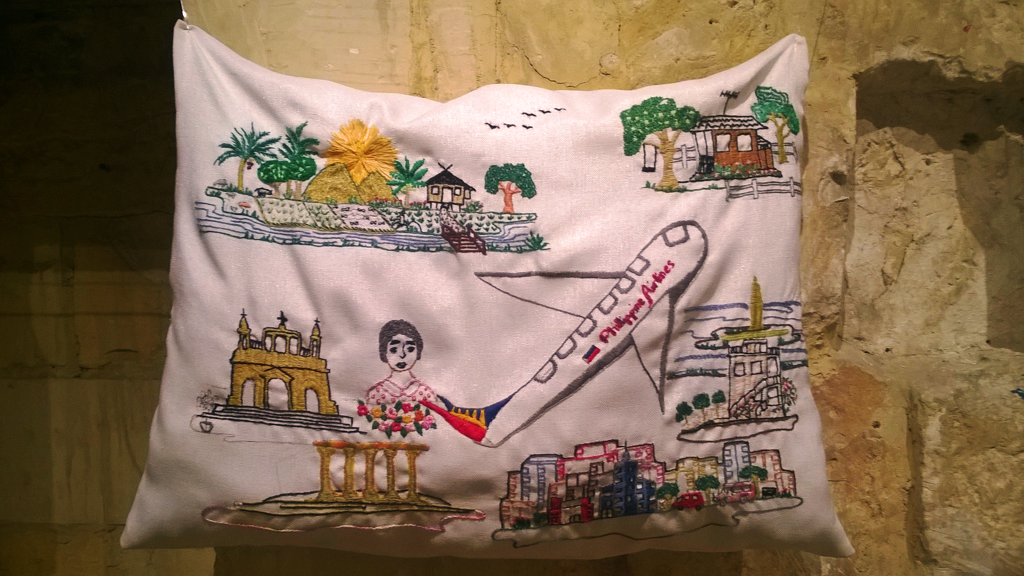
The key element of the exhibition—the embroidered cushions with a speaker inside—tells a story of each participant. The theme is a colourful blend of memories, associated with both Malta and the Philippines: sea, coconut trees, mountains, Maltese townhouses, luzzu boats, churches and airplanes that lace these remote landscapes together.
The craft of embroidery transforms and embellishes the experiences of the participants: it evacuates them from the confines of the private household and turns into artworks accessible to the public. Although the medium of embroidery as traditionally a female craft might further affirm the gender role of the caregivers, it carries another, radical symbolism. A stitch embodies a border and embroidery is an opportunity to define the boundaries by oneself—a privilege too many are deprived of.
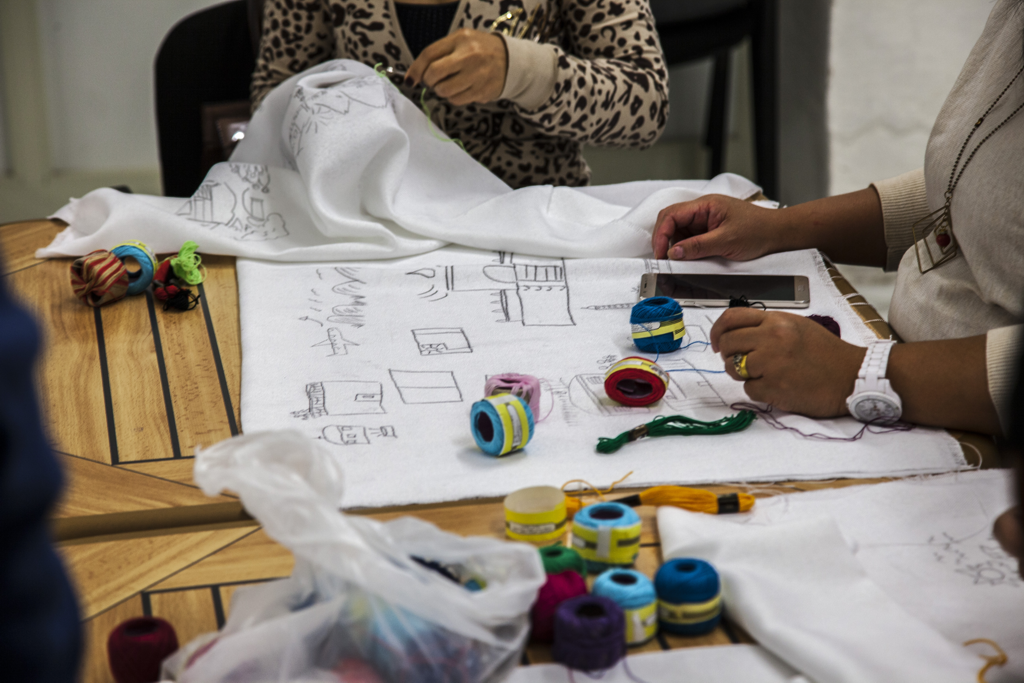
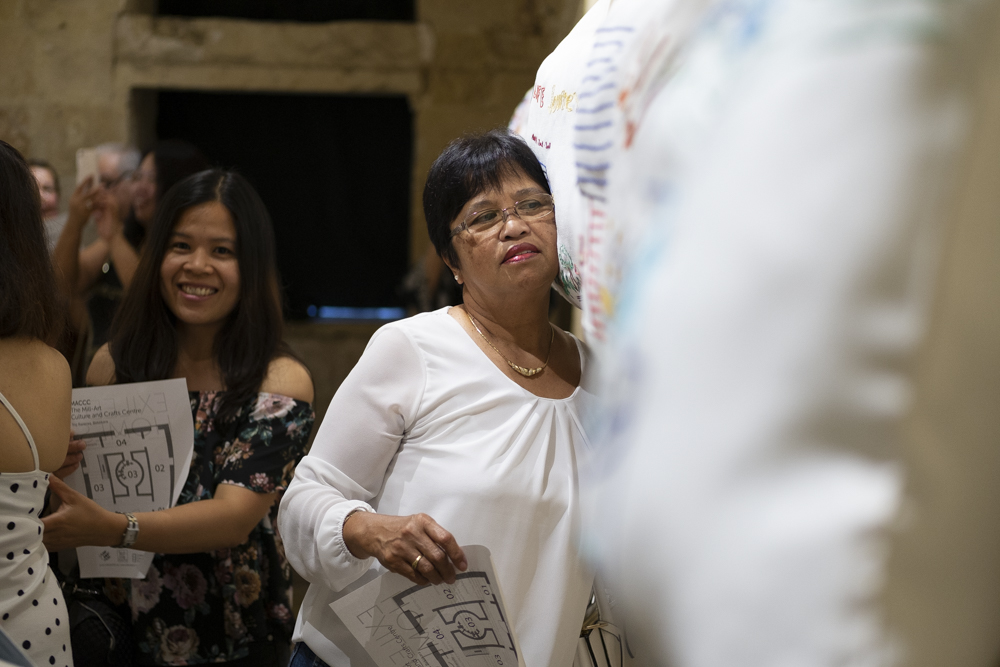
The third section of the exhibition displays all of the 15 women singing the Maltese national anthem in Tagalog, a firm statement of being part of the Maltese society. Although Filipino care workers are seldom accused of stealing jobs of the locals— the idea of migrants as job stealers is very male—they too might come under attack of the nationalism’s rising tide. Singing the anthem might be an act of courtesy, however, I wonder whether the women need to prove the significance of their role further. What could be a better proof of their significance to Malta than the delicate care they give to the elderly? If these women perform the role of a close family member, they too are—should be recognised as—part of the Maltese society.